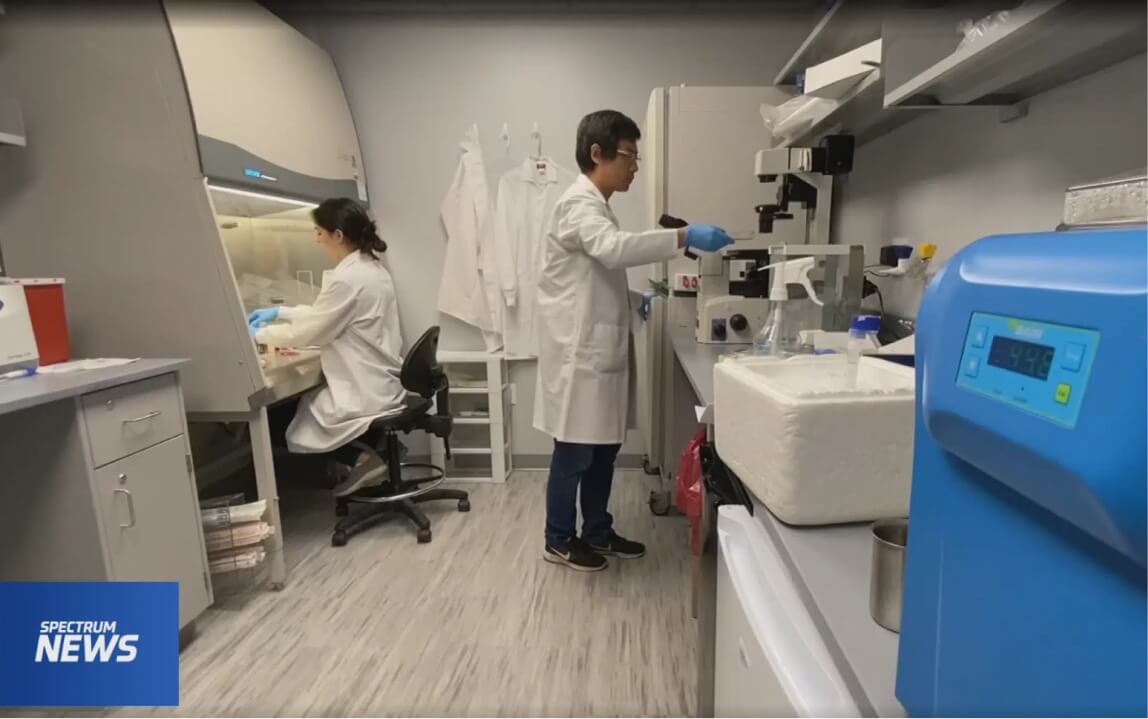Scientists Work to Identify, Treat Heart Disease

September 21, 2022
Spectrum News (video)
Utica scientists work to identify, treat heart disease
By Melissa Krull Utica
PUBLISHED 5:00 PM ET Oct. 13, 2022
Researchers at Masonic Medical Research Institute are studying a gene to see if it impacts heart disease. They have found that the gene, VGLL4, is necessary for embryo development, but not the growth of heart muscle layers.
The more that is learned about the heart, the closer researchers are to treating heart issues.
Dr. Zhiqiang Lin grew up in China, moved to Boston, and about four years ago came to Utica to do cardiovascular research at Masonic Medical Research Institute.
“When I was a Ph.D. student I wanted to do some research that really improved the health of people, and one of the leading causes of death is heart disease,” said Lin.
Lin and his team have been studying a gene in mice to see its role in tissue development. They learned the gene is required for embryo development but not for the muscular tissue growth in the heart.
“Basically, we made two mouse models. When we knock out this gene in the whole body the mouse died very early, but when we only knock it out in the heart muscle cells the mouse is totally fine.
“This is the normal. This is the knockout. That’s the just-born. It’s smaller than this. Here is five days later. The knockout just cannot grow,” said Lin.
As researchers learn more about the molecular mechanisms controlling heart development, they get a better understanding of the heart – and hopefully information to help understand the malformations and diseases affecting it. Lin says the next step is to study if it is beneficial for the heart to have the gene while experiencing stress.
“We already have some data, some very interesting data. So we want to move forward with that and see if we can manipulate the gene’s expression in the heart muscle cells, and then from there to protect the heart from a heart attack,” said Lin.
The hope is to learn more and invent drugs to see if they can change the gene’s expression in a heart attack condition, and save heart muscle cells.
“It’s very exciting to see what this gene is doing in the heart, and it will be more exciting to see if we can manipulate this gene expression in the heart muscle cells and then save the heart,” said Lin.
The institute is hiring more scientists and administrative staff to help in their groundbreaking work.
Lin and his team published a paper on their study. It was posted online by the Multidisciplinary Digital Publishing Institute.
News-Medical.Net (AZO Media, UK)
Syracuse News Today
https://syracusenewstoday.com/utica-doctor-finding-new-way-to-treat-heart-disease/
SUNY Polytechnic Institute
https://sunypoly.edu/news/suny-poly-senior-aaron-farley-co-authors-research-publication-cells.html
SUNY Poly Senior Aaron Farley Co-Authors Research Publication in ‘Cells’
“SUNY Poly Undergraduate student Aaron Farley, a senior studying Biology, has been credited as a co-author for a newly published article in a highly respected, peer-reviewed science journal, Cells.
This opportunity to conduct this exciting research arose when Aaron was studying in the 10-week ‘Summer Fellows’ program at the Masonic Medical Research Institute in Utica, NY, with Dr. Lin, who led the study.”
Original Study Article
Sheldon, Caroline, Aaron Farley, Qing Ma, William T. Pu, and Zhiqiang Lin. 2022. “Depletion of VGLL4 Causes Perinatal Lethality without Affecting Myocardial Development” Cells 11, no. 18: 2832.
https://doi.org/10.3390/cells11182832
Chase Kessinger, Ph.D.
Chase Kessinger, Ph.D.